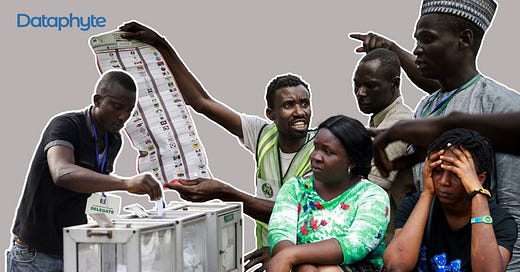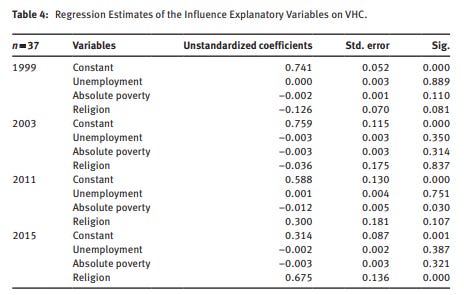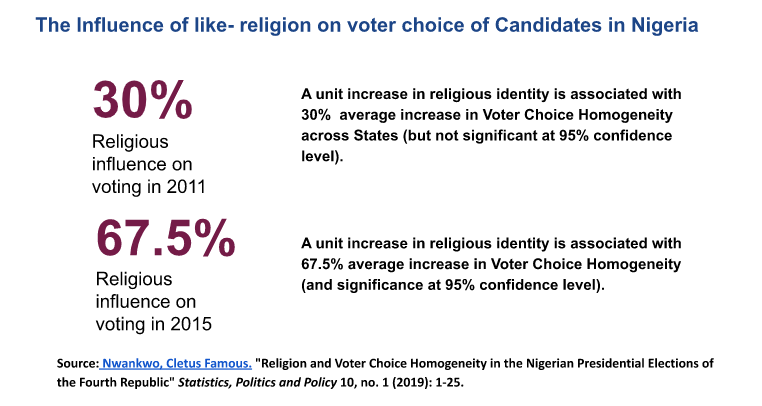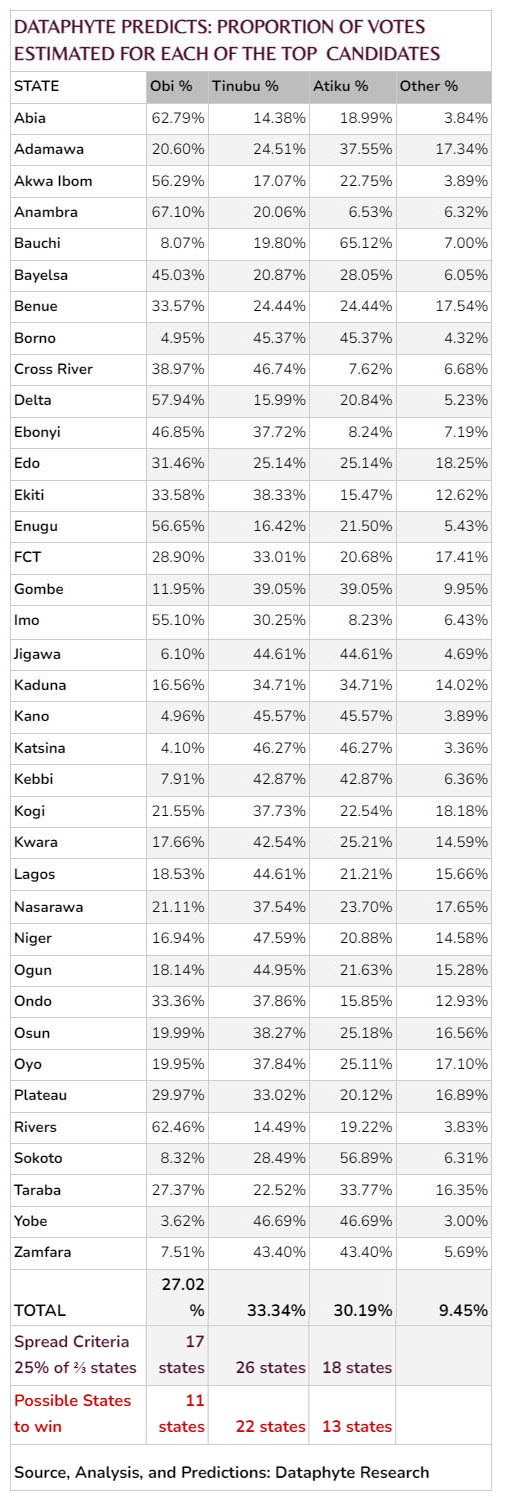President Tinubu: Predilections and Predictions
President Tinubu: State level Predilections and Statistical Predictions
The heat is on!
D-day is 14 days away!
Who will win the presidential race the coming Saturday?
I don’t have a guess. So we went ground-truthing stats, state by state. We found the current scenario to be similar to that in the 2015 elections. We obtained and analysed past voting patterns, voter turnouts, voter choice homogeneity, the religious homogeneity index, and so on.
In short, by deploying reliable statistical estimators, we measured the people’s voting predilections and came to the conclusion that Tinubu would win the popular votes and would be the only candidate to satisfy the spread criteria of a minimum of 25% votes in ⅔ of the 36 states (We’ll discuss the methodology in detail later).
This prediction cancels out the oft-speculated possibility of having ties at the first instance of the election on February 25, which would then occasion a rerun to determine the winner.
The race is so close and uncertain that people are beginning to wonder, “Would there be a clear winner come February 25, 2023, or would there be a rerun?”
The reason is that Nigeria’s political landscape underwent a seismic shift for good with the emergence of Peter Obi of the Labour Party (LP) in the race.
But how could Tinubu ever have a clear win?
Nigerians vote, they don’t choose!
Tinubu would win in 2023 as long as the majority of Nigerian voters prioritise the ethnicity and religion of the candidates above the candidates’ capacity to resolve common existential issues like unemployment or absolute poverty.
In the paper, Voting without Choosing? Ethnic Voting Behaviour and Voting Patterns in Nigeria's 2015 Presidential Election and Implications for Institutionalisation of Social Conflicts, Kialee Nyiayaana comments:
“While scholarly examinations portray the presidential election results as 'victory for democracy', not least because an incumbent president was defeated for the first time in Nigeria, analysis of the spatial structure of votes cast reveals a predominant pattern of voting along ethnic, religious and geospatial lines.”
The paper further contends that “this identity-based voting not only translates into a phenomenon of 'voting without choosing,' but is also problematic for social cohesion, interethnic harmony and peacebuilding in Nigeria.”
Nigeria’s 6 Geopolitical Zones
Source: Nyiayaana, Kialee. (2019). Voting without Choosing? Ethnic Voting Behaviour and Voting Patterns in Nigeria's 2015 Presidential Election and Implications for Institutionalisation of Social Conflicts. 7. 34.
Cletus Famous Nwankwo reinforces this voting predilection statistically in his paper Religion and Voter Choice Homogeneity in the Nigerian Presidential Elections of the Fourth Republic. In his study, he finds no support for the influence of socioeconomic variables such as unemployment or poverty on voter choice.
“The socio-economic indicators examined show negative effect on VCH (Voter Choice Homogeneity) and were insignificant throughout the elections, which highlight perhaps why religion is such a significant factor in the public discourse of the elements of voting in Nigeria, Nwankwo submitted.
Source: Nwankwo, Cletus Famous. "Religion and Voter Choice Homogeneity in the Nigerian Presidential Elections of the Fourth Republic" Statistics, Politics and Policy 10, no. 1 (2019): 1-25.
Religion, Region or/and Ethnicity decided the 2003, 2011, and 2015 presidential elections, not necessarily the Candidates’ fitness for office
It appears many of Senator Bola Tinubu’s delicate political manoeuvres were informed by the proven equations of victory in the 2015 elections which pitched President Goodluck Jonathan, a Christian from the South against General Muhammadu Buhari, a Muslim from the North of the country.
A major case in point was Tinubu’s choice of a Muslim from the North as his Vice Presidential pick.
Nwankwo noted:
“The emergence of Jonathan as the PDP candidate in the 2011 election meant that Buhari will face yet another Christian from the south. Consequently, when the result of the elections is mapped as Figure 2 shows, party support became polarised in a north-south dimension with a large support for Jonathan’s PDP in the south and Buhari’s Congress for Progressive Change (CPC) in the north.
State where parties won in the 1999, 2003, 2011, and 2019 elections
Source: Nwankwo, Cletus Famous. "Religion and Voter Choice Homogeneity in the Nigerian Presidential Elections of the Fourth Republic" Statistics, Politics and Policy 10, no. 1 (2019): 1-25.
“Compared with previous elections, the regression coefficient shows a weak positive relationship between religion and VCH. A unit increase in religious identity is associated with 0.300 increase in VCH but not significant at 95% confidence level.”
However, by 2015, the regression results showed “there is a significant and robust positive relationship between religion and VCH. The socio-economic variables show a weak negative association with VCH. A unit increase in religious identity is associated with 0.675 increase in VCH at 95% confidence level”, Nwankwo observed.
How Tinubu may win the 2023 election
Dataphyte Research’s analysis of election trends since 1999 till date projects Senator Bola Tinubu to win Nigeria’s 2023 presidential race, except the majority of the people suddenly begin to consider the capacity of elected persons to deliver socioeconomic benefits to their constituents.
The beneficiary next in line when that ideological change happens is former Vice President Atiku Abubakar.
Dataphyte Research adapted results from the analysis of Voter Choice Homogeneity (VCH) with respect to Religious Homogeneity Index (RHI) across Nigeria’s 36 states and the Federal Capital Territory (FCT) to determine voting outcomes across the states.
Source: Nwankwo, Cletus Famous. "Religion and Voter Choice Homogeneity in the Nigerian Presidential Elections of the Fourth Republic" Statistics, Politics and Policy 10, no. 1 (2019): 1-25.
By apportioning equal weights to religion, ethnicity, and party structure in each state with respect to their respective VCH and RHI scores, the Dataphyte Research team concluded that Tinubu would secure 33.34% of the total votes. Next, Atiku Abubakar with 30.19% of the total votes, followed by Peter Obi’s 27.02% of the total votes.
Below is the Summary of the projected winners across the 36 states and the FCT.
“Whoever wins, Who Cares?”
“Many do.”
Viable young people rendered obsolete without entrepreneurial and employable resources.
Vulnerable old people rendered penniless without their entitlements who are forced to grapple with the terror of inflation on food, energy, and other essential goods.
Villains in public service, indifferent politicians at ward levels, and dishonest countrymen who urgently need another president to serve as the scapegoat to hang for the atrocities citizens themselves commit every day against their fatherland.
So, the election frenzy fills the air - voters’ predilections, victory predictions in various proportions - pundits’ permutations, personal preferences, and other paid projections.
And everyone seems to be caught up in this heat.
Naked lights of primordial opinions pry through each man’s political facade. And like Dennis Brutus’ religious sense, the ethnic self too asserts itself, oftentimes over reason, over real-time realities on the ground.
Yet, Neil McCauley (Robert De Niro) prescribed in the 1995 film Heat, “Don’t let yourself get attached to anything you are not willing to walk out on in 30 seconds flat if you feel the heat around the corner.”
We should be able to walk away from the heat of groupthink and disconnect from the hotspot of guesswork on the forthcoming election outcomes and indeed on all matters relating to nation-building.
The political candidates, like athletes, have run one heat after the other, from campaign grounds to Chatham House and back.
As the heat went on, it was easy to mark the athletes with fast legs, frail legs, and fraught legs and fine legs.
But we must always be able to walk out in 30 seconds from arenas where people insist endurance matters more than speed in a sprint race or where the consensus is that speed matters more than endurance in a marathon.
If Tinubu wins, as our pure statistical inference and objective scenario simulations indicate, it's a victory for the candidate and another loss to a deeply divided citizenry.
We’ll show you step by step how we arrived at our predictions (further details on our methodology) in the Data Dive next week. Till then, enjoy this weekend, prepare to Cast your votes ☑️ wisely and Catch ya on D-day!
Editor’s Note: “This report has been updated to reflect corrections to the name of a source”













How is Tinubu going to come 2nd in Anambra and win Plateau?
Be playing
Tinubu winning states like crossriver, plateau, FCT and even Nasarawa is very strange. What methodology did you use to get that result. Anyways this is if Nigerians vote because of tribe and religion which I don't think will be the case on February 25th